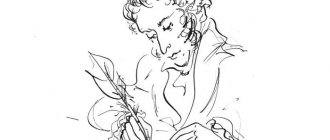Sonnet 23
As an unperfect actor on the stage, Who with his fear is put besides his part, Or some fierce thing replete with too much rage, Whose strength’s abundance weakens his own heart; So I, for fear of trust, forget to say The perfect ceremony of love’s rite, And in mine own love’s strength seem to decay, O’ercharg’d with burden of mine own love’s might. O, let my books be then the eloquence And dumb presagers of my speaking breast; Who plead for love, and look for recompense, More than that tongue that more hath more express’d. O, learn to read what silent love hath writ: To hear with eyes belongs to love’s fine wit.
(William Shakespeare)
***
Как тот актер, который, оробев, Теряет нить давно знакомой роли, Как тот безумец, что, впадая в гнев, В избытке сил теряет силу воли, —
Так я молчу, не зная, что сказать, Не оттого, что сердце охладело. Нет, на мои уста кладет печать Моя любовь, которой нет предела.
Так пусть же книга говорит с тобой. Пускай она, безмолвный мой ходатай, Идет к тебе с признаньем и мольбой И справедливой требует расплаты.
Прочтешь ли ты слова любви немой? Услышишь ли глазами голос мой?
(Уильям Шекспир, перевод Самуила Маршака)
Sonnet 18
Shall I compare thee to a summer’s day? Thou art more lovely and more temperate: Rough winds do shake the darling buds of May, And summer’s lease hath all too short a date: Sometimes too hot the eye of heaven shines, And too often is his gold complexion dimm’d: And every fair from fair sometimes declines, By chance or natures changing course untrimm’d; By thy eternal summer shall not fade, Nor lose possession of that fair thou owest; Nor shall Death brag thou wander’st in his shade, When in eternal lines to time thou growest: So long as men can breathe or eyes can see, So long lives this and this gives life to thee.
(William Shakespeare)
***
Сравню ли с летним днем твои черты? Но ты милей, умеренней и краше. Ломает буря майские цветы, И так недолговечно лето наше!
То нам слепит глаза небесный глаз, То светлый лик скрывает непогода. Ласкает, нежит и терзает нас Своей случайной прихотью природа.
А у тебя не убывает день, Не увядает солнечное лето. И смертная тебя не скроет тень — Ты будешь вечно жить в строках поэта.
Среди живых ты будешь до тех пор, Доколе дышит грудь и видит взор.
(Уильям Шекспир, перевод Самуила Маршака)
Sonnet 102
My love is strengthened, though more weak in seeming; I love not less, though less the show appear. That love is merchandised whose rich esteeming The owner’s tongue doth publish everywhere. Our love was new, and then but in the spring, When I was wont to greet it with my lays, As Philomel in summer’s front doth sing, And stops his pipe in growth of riper days. Not that the summer is less pleasant now Than when her mournful hymns did hush the night, But that wild music burthens every bough, And sweets grown common lose their dear delight. Therefore, like her, I sometime hold my tongue, Because I would not dull you with my song.
(William Shakespeare)
***
Люблю, — но реже говорю об этом, Люблю нежней, — но не для многих глаз. Торгует чувством тот, что перед светом Всю душу выставляет напоказ.
Тебя встречал я песней, как приветом, Когда любовь нова была для нас. Так соловей гремит в полночный час Весной, но флейту забывает летом.
Ночь не лишится прелести своей, Когда его умолкнут излиянья. Но музыка, звуча со всех ветвей, Обычной став, теряет обаянье.
И я умолк подобно соловью: Свое пропел и больше не пою.
(Уильям Шекспир, перевод Самуила Маршака)
Sonnet 37
As a decrepit father takes delight To see his active child do deeds of youth, So I, made lame by fortune’s dearest spite, Take all my comfort of thy worth and truth. For whether beauty, birth, or wealth, or wit, Or any of these all, or all, or more, Entitled in thy parts do crownèd sit, I make my love engrafted to this store. So then I am not lame, poor, nor despised, Whilst that this shadow doth such substance give That I in thy abundance am sufficed, And by a part of all thy glory live. Look what is best, that best I wish in thee. This wish I have; then ten times happy me.
(William Shakespeare)
***
Как радует отца на склоне дней Наследников отвага молодая, Так правдою и славою твоей Любуюсь я, бесславно увядая.
Великодушье, знатность, красота, И острый ум, и сила, и здоровье — Едва ль не каждая твоя черта Передается мне с твоей любовью.
Не беден я, не слаб, не одинок, И тень любви, что на меня ложится, Таких щедрот несет с собой поток, Что я живу одной ее частицей.
Все, что тебе могу я пожелать, Нисходит от тебя как благодать.
(Уильям Шекспир, перевод Самуила Маршака)
Sonnet 57
Being your slave, what should I do but tend Upon the hours and times of your desire? I have no precious time at all to spend, Nor services to do, till you require. Nor dare I chide the world-without-end hour Whilst I, my sovereign, watch the clock for you, Nor think the bitterness of absence sour When you have bid your servant once adieu; Nor dare I question with my jealous thought Where you may be, or your affairs suppose, But, like a sad slave, stay and think of nought Save, where you are how happy you make those. So true a fool is love that in your will, Though you do any thing, he thinks no ill.
(William Shakespeare)
***
Для верных слуг нет ничего другого, Как ожидать у двери госпожу. Так, прихотям твоим служить готовый, Я в ожиданье время провожу.
Я про себя бранить не смею скуку, За стрелками часов твоих следя. Не проклинаю горькую разлуку, За дверь твою по знаку выходя.
Не позволяю помыслам ревнивым Переступать заветный твой порог, И, бедный раб, считаю я счастливым Того, кто час пробыть с тобою мог.
Что хочешь делай. Я лишился зренья, И нет во мне ни тени подозренья.
(Уильям Шекспир, перевод Самуила Маршака)
Sonnet 47
Betwixt mine eye and heart a league is took, And each doth good turns now unto the other. When that mine eye is famished for a look, Or heart in love with sighs himself doth smother, With my love’s picture then my eye doth feast And to the painted banquet bids my heart. Another time mine eye is my heart’s guest, And in his thoughts of love doth share a part. So either by thy picture or my love, Thyself away are present still with me; For thou no farther than my thoughts canst move, And I am still with them, and they with thee; Or if they sleep, thy picture in my sight Awakes my heart to heart’s and eye’s delight.
(William Shakespeare)
***
У сердца с глазом — тайный договор: Они друг другу облегчают муки, Когда тебя напрасно ищет взор И сердце задыхается в разлуке.
Твоим изображеньем зоркий глаз Дает и сердцу любоваться вволю. А сердце глазу в свой урочный час Мечты любовной уступает долю.
Так в помыслах моих иль во плоти Ты предо мной в мгновение любое. Не дальше мысли можешь ты уйти. Я неразлучен с ней, она — с тобою.
Мой взор тебя рисует и во сне И будит сердце, спящее во мне.
(Уильям Шекспир, перевод Самуила Маршака)
Sonnet 29
When, in disgrace with fortune and men’s eyes, I all alone beweep my outcast state And trouble deaf heaven with my bootless cries And look upon myself and curse my fate, Wishing me like to one more rich in hope, Featured like him, like him with friends possess’d, Desiring this man’s art and that man’s scope, With what I most enjoy contented least; Yet in these thoughts myself almost despising, Haply I think on thee, and then my state, Like to the lark at break of day arising From sullen earth, sings hymns at heaven’s gate; For thy sweet love remember’d such wealth brings That then I scorn to change my state with kings.
(William Shakespeare)
***
Когда в раздоре с миром и судьбой, Припомнив годы, полные невзгод, Тревожу я бесплодною мольбой Глухой и равнодушный небосвод
И, жалуясь на горестный удел, Готов меняться жребием своим С тем, кто в искусстве больше преуспел, Богат надеждой и людьми любим, —
Тогда, внезапно вспомнив о тебе, Я малодушье жалкое кляну, И жаворонком, вопреки судьбе, Моя душа несется в вышину.
С твоей любовью, с памятью о ней Всех королей на свете я сильней.
(Уильям Шекспир, перевод Самуила Маршака)
Sonnet 116
Let me not to the marriage of true minds Admit impediments. Love is not love Which alters when it alteration finds, Or bends with the remover to remove. O no, it is an ever-fixèd mark That looks on tempests and is never shaken; It is the star to every wand’ring bark, Whose worth’s unknown, although his height be taken. Love’s not time’s fool, though rosy lips and cheeks Within his bending sickle’s compass come: Love alters not with his brief hours and weeks, But bears it out even to the edge of doom. If this be error and upon me proved, I never writ, nor no man ever loved.
(William Shakespeare)
***
Мешать соединенью двух сердец Я не намерен. Может ли измена Любви безмерной положить конец? Любовь не знает убыли и тлена.
Любовь — над бурей поднятый маяк, Не меркнущий во мраке и тумане. Любовь — звезда, которою моряк Определяет место в океане.
Любовь — не кукла жалкая в руках У времени, стирающего розы На пламенных устах и на щеках, И не страшны ей времени угрозы.
А если я не прав и лжет мой стих, То нет любви — и нет стихов моих!
(Уильям Шекспир, перевод Самуила Маршака)
Sonnet 61
Is it thy will thy image should keep open My heavy eyelids to the weary night? Dost thou desire my slumbers should be broken, While shadows like to thee do mock my sight? Is it thy spirit that thou send’st from thee So far from home into my deeds to pry, To find out shames and idle hours in me, The scope and tenor of thy jealousy? O no; thy love, though much, is not so great. It is my love that keeps mine eye awake, Mine own true love that doth my rest defeat, To play the watchman ever for thy sake. For thee watch I whilst thou dost wake elsewhére, From me far off, with others all too near.
(William Shakespeare)
***
Твоя ль вина, что милый образ твой Не позволяет мне сомкнуть ресницы И, стоя у меня над головой, Тяжелым векам не дает закрыться?
Твоя ль душа приходит в тишине Мои дела и помыслы проверить, Всю ложь и праздность обличить во мне, Всю жизнь мою, как свой удел, измерить?
О нет, любовь твоя не так сильна, Чтоб к моему являться изголовью, Моя, моя любовь не знает сна. На страже мы стоим с моей любовью.
Я не могу забыться сном, пока Ты — от меня вдали — к другим близка.
(Уильям Шекспир, перевод Самуила Маршака)







